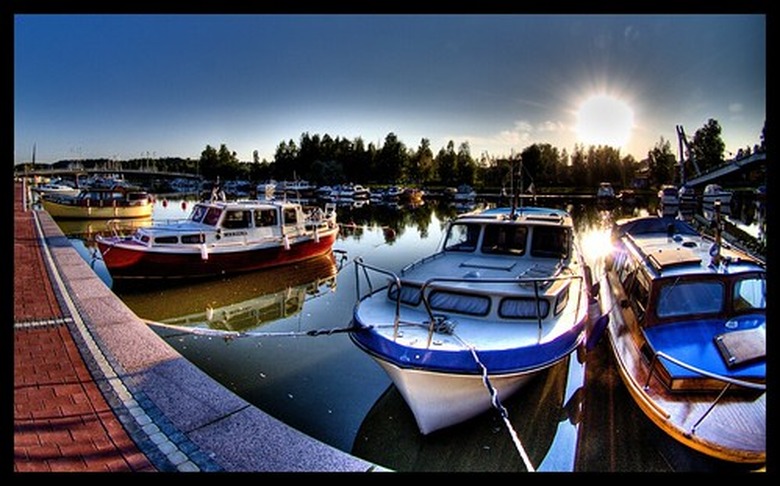Marine Battery Vs. Deep Cycle Battery
All batteries are electrical storage devices; they store rather than make electricity. Electrical energy is stored or released when the chemicals inside the battery change. The main battery applications are starting battery, which is typically used to start and run engines, marine battery and deep cycle battery. Deep cycle batteries include solar electric (PV), traction, RV and backup power batteries.
TL;DR (Too Long; Didn't Read)
A marine battery typically falls between a starting and deep cycle battery, although some marine batteries are true deep cycle batteries. Often, the labels "marine" and "deep cycle" are used interchangeably or together, which causes some confusion.
Deep Cycle Batteries
Deep Cycle Batteries
Deep cycle batteries have thick plates and can be discharged down to 80 percent (deep cycled) time after time without causing damage. In contrast, starter batteries deliver short, high-current bursts to crank an engine, meaning they frequently discharge only a small part of their capacity. The main difference between true deep cycle batteries and other types is that deep cycle batteries have solid – not sponge – lead plates. They are most commonly used in industrial applications for backups and in solar power plants. True deep cycle brands include Crown, Deka and Trojan.
Marine Batteries
Marine Batteries
Marine batteries may be starting batteries, dual-purpose batteries or deep cycle batteries. They are usually a hybrid of starting and deep cycle batteries, with lead sponge plates that are coarser and heavier than starting battery plates but not as thick as true deep cycle battery plates.
It can be difficult to tell what you get in a marine battery, and the only way to know for sure is to cut one open. The terms "marine" and "deep cycle" are often used interchangeably or together, which adds to the confusion. For example, a battery labeled "deep cycle marine battery" may be constructed the same as RV batteries labeled "deep cycle."
A starting battery is fine for an inboard or outboard marine engine, but if you need to power a trolling motor, go for a deep cycle battery.
Battery Life Span
Battery Life Span
The life span of a deep cycle battery depends on how it is used, maintained and charged, as well as external factors such as temperature. How often and how deep you deep cycle a battery also affects life span. While the variables make it almost impossible to provide a definite life span, typically a marine battery lasts for one to six years. An AGM (absorbed glass mat) deep cycle battery usually lasts for four to eight years, a gelled deep cycle battery for two to five years, and an industrial deep cycle battery for 10 to 20 years.
Cite This Article
MLA
Gillespie, Claire. "Marine Battery Vs. Deep Cycle Battery" sciencing.com, https://www.sciencing.com/marine-vs-deep-cycle-battery-5606295/. 4 June 2018.
APA
Gillespie, Claire. (2018, June 4). Marine Battery Vs. Deep Cycle Battery. sciencing.com. Retrieved from https://www.sciencing.com/marine-vs-deep-cycle-battery-5606295/
Chicago
Gillespie, Claire. Marine Battery Vs. Deep Cycle Battery last modified March 24, 2022. https://www.sciencing.com/marine-vs-deep-cycle-battery-5606295/
